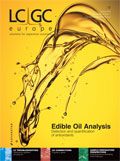MicroScale Bioseparations (MSB) 2013
The 29th International Symposium on MicroScale Bioseparations (MSB 2013) will be held 10–14 March 2013, at the University of Virginia in Charlottesville, Virginia, USA. The conference will build on the rich history of separation science and discuss a wide spectrum of current microscale bioseparation techniques.
The 29th International Symposium on MicroScale Bioseparations (MSB 2013) will be held 10–14 March 2013, at the University of Virginia in Charlottesville, Virginia, USA. The conference will build on the rich history of separation science and discuss a wide spectrum of current microscale bioseparation techniques. The 2013 conference is the 25th year of the series and was previously held in locations throughout North America, Europe and Asia. The University of Virginia, founded in 1819 by Thomas Jefferson, is a historic academic venue and ideal for the event, according to the organisers.
The symposium was first held in 1989 in Boston, Massachusetts, USA, with the format of the symposium continuing to evolve. The organizers of MSB 2013 report that they will introduce new and substantial changes to the programme format. Registration is currently limited to 375 participants to encourage scientific exchange between delegates and preserve the academic atmosphere of the conference. About 70% of the presentation programme will be built built around blind peer-reviewed presentation abstracts. A layer of confidentiality has been added to protect unpublished work, allowing comfortable and open discussion in forums arranged following the presentations.

Among the many topics to be discussed in key note, plenary lectures and presentations include biologics; clinical pharmacogenomics; carbohydrates; nucleic acids; food and health; proteomics; affinity capillary electrophoresis; glycomics; hyphenated techniques; metabolomics; micro- and nano-scale sample preparation; integrated microsystems; forensics; microfluidic controls; nanoparticle characterisation; novel detection; late breaking developments and advanced instrumentation. The MSB 2013 programme will also include a number of short half- and full-day training workshops and courses, including a laboratory-based course on paper-based analytical devices.
A further addition to the MSB 2013 programme is a complimentary Science Café scheduled daily, to provide refreshment during discussions of advances in commercial MicroScale Bioseparation products, alongside presentations by sponsors presenting new technologies.
An essential part of MSB 2013 will be the recognition of the achievements of analytical scientists, represented by a series of award ceremonies and presentations. The Arnold O. Beckman Medal and Award which is presented annually at the North American and European MSB conferences respectively will be presented to a nominated scientist for lifetime contributions in the field of electrodriven separation techniques.
A symposium of poster presentations will be held to promote the exchange of scientific ideas at the cutting edge of separation science. A poster award competition will be held to reward the top three presentations. The selected authors will have the opportunity to present an oral presentation during the symposium finale, a must-see attraction of the conference.
To encourage student participation and stimulate discussion between delegates, MSB 2013 will provide a limited number of travel grants for students and post-docs presenting at the conference; research students from industry and academia are encouraged to apply.
The conference co-chair Jeff Chapman, director of marketing, Beckman Coulter Life Sciences looks "forward to a deeply engaging, scientifically rewarding gathering of the microscale separation community" and reports that "attendees at this year's meeting will find much to absorb, and be hosted by a wonderful campus and community."
For more detailed information visit: www.msb2013.net
10–14 March 2013
29th Symposium on Microscale Preparations
University of Virginia, Charlottesville, Virginia, USA
Organizers: UVa Foundation
Tel: (434) 960 6525
E-mail: MSB2013@comcast.net
Website: www.msb2013.net
17–21 March 2013
Pittcon 2013 Conference and Exposition
Pennsylvania Convention Centre, Philadelphia, USA
Organizers: The Pittsburgh Conference on Analytical Chemistry and Applied Spectroscopy
Tel: 412-825-3220
E-mail: info@pittcon.org
Website: www.pittcon.org
24–25 April 2013
Ion Chromatography 2013
Zabrze, Poland
Organizers: Institute of Environmental Engineering of Polish Academy of Science
Tel: +48 32 2716481
Fax: +48 32 2717470
E-mail: michalski@ipis.zabrze.pl
Website: www.ipis.zabrze.pl/en/conferences/65-planowane-ipi-pan
16–20 June 2013
HPLC2013 Amsterdam
Amsterdam RAI Conference Centre, Amsterdam, The Netherlands
Co-chairs: Peter Schoenmakers and Wim Kok
E-mail: hplc2013@caos.nl
Website: www.hplc2013.org
6–9 October 2013
20th International Symposium on Electro- and Liquid-Phase Separation Techniques, ITP2013
Puerto de la Cruz, Tenerife, Canary Islands, Spain
Tel: +34 922 318990
Fax: +34 922 318003
E-mail: itp2013@ull.es
Website: http://www.itp2013.ull.es
Send any event news to Kate Mosford kmosford@advanstar.com

Regulatory Deadlines and Supply Chain Challenges Take Center Stage in Nitrosamine Discussion
April 10th 2025During an LCGC International peer exchange, Aloka Srinivasan, Mayank Bhanti, and Amber Burch discussed the regulatory deadlines and supply chain challenges that come with nitrosamine analysis.











